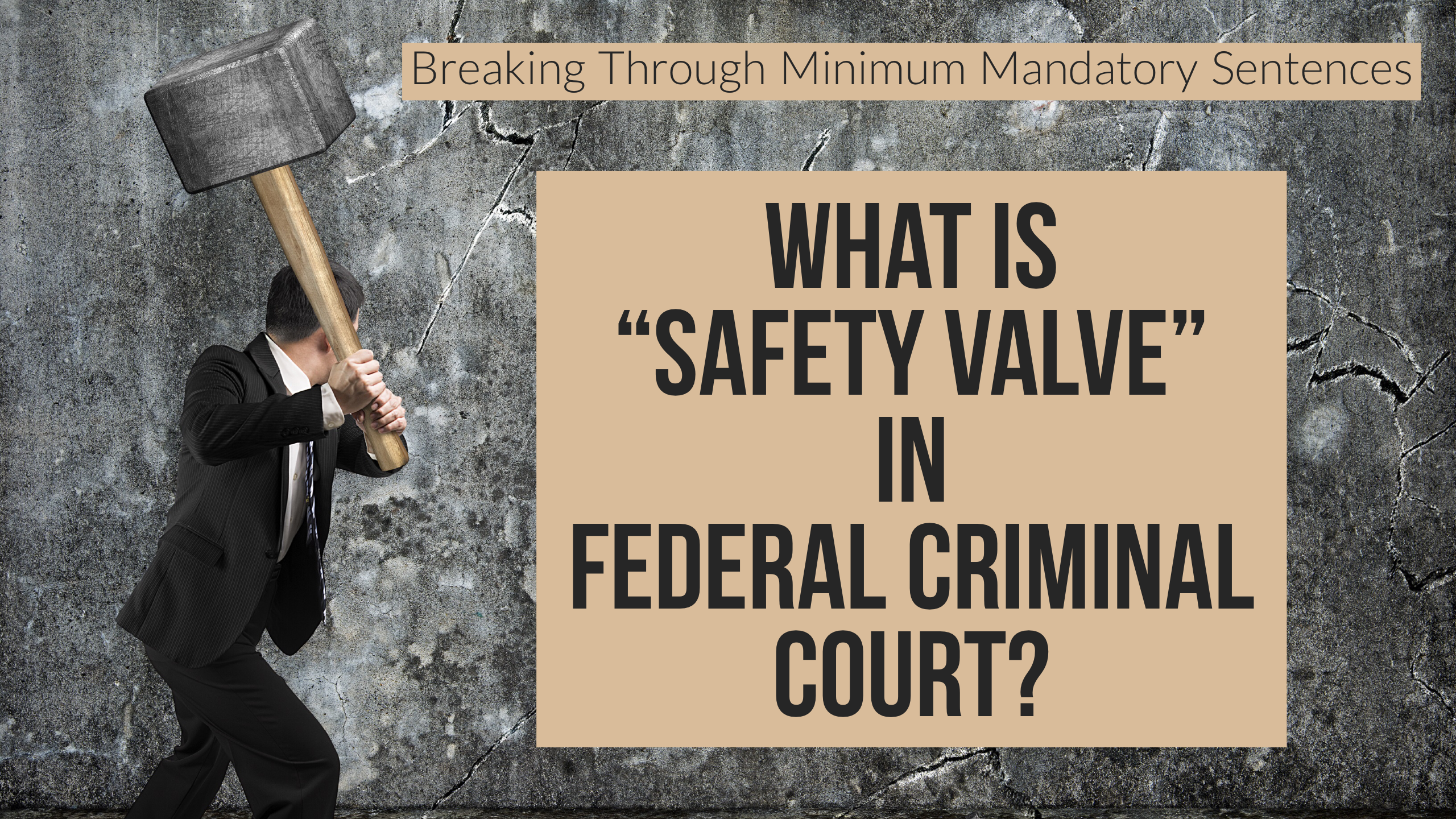
As every criminal defense lawyer knows, there are some very draconian minimum mandatory sentences in Federal criminal court. There are federal minimum mandatory sentences for certain drug offenses, firearm offenses, and for defendants who have certain convictions. There are two ways to break the minimum mandatory sentence, which then allows a judge to sentence you below the minimum mandatory. The first is called “substantial assistance.” Basically, if you snitch and the government wants your information, uses your information, and they determine that it was worthy of a sentence below the minimum mandatory, they can file a substantial assistant motion and if granted by the judge, the minimum mandatory would no longer apply. You can only get less than the minimum mandatory sentence if the prosecutor files the motion. If they decide not to file the motion, the judge must sentence you to the minimum mandatory sentence up to the maximum sentence. But what if you don’t want to snitch? What if you don’t have any information that the government is interested in? There is one more option that will allow the judge to sentence you below the minimum mandatory sentence: Safety Valve.
What is Safety Valve?
The “Safety Valve” provision is a provision of law codified in 18 United States Code §3553(f). It specifically allows a judge to sentence you below the minimum mandatory required by law. However, you must be eligible. There is also a two level reduction in the sentencing guidelines under United States Sentencing Guidelines §2D1.1(b)(17).
How do I get Safety Valve?
In order to be eligible for Safety Valve, you must meet the requirements set out in 18 U.S.C. §3553(f).
- You do not have more than 1 criminal history point.
- You did not use violence or credible threats of violence or possess a firearm or other dangerous weapon (or induce another participant)
- The offense did not result in death or serious bodily injury to any person
- You were not an organizer, leader, manager or supervisor of others in the offense and not engaged in a continuing criminal enterprise
- You truthfully provided the government all information related to the offense.
A common requirement that disqualifies people is the prior criminal record requirement. Basically, anything other than a minor one time conviction will disqualify you. However, old convictions may not count and some minor convictions also do not count. There is a whole section in federal sentencing guidelines manual that addresses which prior convictions count and how many points are assessed.
In order to get safety valve, you, through your criminal defense attorney, must contact the prosecuting attorney before your sentencing hearing, and tell them that you want to provide them with a statement. You must be willing to tell them everything you know about the offense, who else was involved, and you must be forthcoming and truthful. It will be up to the judge to determine whether you meet this requirement. You should not wait until the last minute either, as the prosecutor has no duty to take your statement within a short period of time before the sentencing hearing and the judge has no duty to continue your sentencing hearing to give you time to provide the government with a statement.
One difference between Safety Valve and Substantial Assistance is that there is no requirement for you to cooperate against anyone else. So, once your provide the information to the prosecutor, you should become eligible to seek safety valve at your sentencing, without having to cooperate against anyone else.
What crimes are eligible for Safety Valve?
Not all crimes are eligible for Safety Valve. 18 U.S.C. §3553(f) specifies which crimes are eligible for Safety Valve consideration.
- 21 U.S.C. 841
- 21 U.S.C. 844
- 21 U.S.C. 846
- 21 U.S.C. 960
- 21 U.S.C. 963
If you are not convicted under one of these statutes, there is no Safety Valve option. For example, Safety Valve is not an option for someone convicted under the Aggravated Identity Theft statute that carries a 2 year minimum mandatory sentence consecutive to any underlying sentence. Similarly, if you were convicted of similar conduct to those eligible for safety valve, but were convicted under a statute not listed above, you still would not be safety valve eligible. For example, if you were convicted fo possession with intent to distribute cocaine while aboard a vessel subject to United States jurisdiction in violation of 46 U.S.C. app. §1903(a), you would not be eligible for safety valve, even though someone convicted of the same conduct on land would be eligible.
 Jeremy Lasnetski, managing partner at Lasnetski Gihon Law is a Florida Bar Board Certified Criminal Trial Lawyer and has been practicing criminal law in Jacksonville for over 16 years. Mr. Lasnetski received his Bachelor of Arts degree with honors from the University of Florida in 1997 and went on to obtain a law degree and an M.B.A. from the University of Florida in 2001.
Jeremy Lasnetski, managing partner at Lasnetski Gihon Law is a Florida Bar Board Certified Criminal Trial Lawyer and has been practicing criminal law in Jacksonville for over 16 years. Mr. Lasnetski received his Bachelor of Arts degree with honors from the University of Florida in 1997 and went on to obtain a law degree and an M.B.A. from the University of Florida in 2001.
After graduation, Mr. Lasnetski accepted a position as a prosecutor at the State Attorney’s Office in Jacksonville. During the next 6 1/2 years as a prosecutor, Mr. Lasnetski tried more than 50 criminal trials, including more than 40 felony trials. He was promoted in 2007 to Division Chief of the Repeat Offender Unit. Mr. Lasnetski was also a full time member of the Homicide Prosecution Team. In 2008, Mr. Lasnetski formed the Law Office of Lasnetski Gihon Law and began defending citizens in criminal court. He represents clients in both State and Federal criminal courts.
 Jacksonville Criminal Lawyer Blog
Jacksonville Criminal Lawyer Blog

